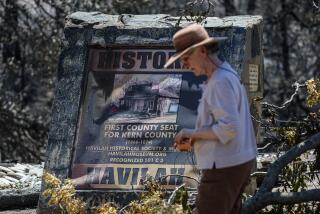He Mined History for Gold
A Texan has beaten California to the defining moment in the state’s history.
Every California schoolchild learns about James Marshall’s discovery of gold while building a sawmill alongside the American River at Coloma on Jan. 24, 1848, exclaiming, “I have found it,” or so he said later.
A new book by Texas A&M; professor H.W. Brands takes the schoolkid facts and richens them into insights like this: The bitter debate over the admission of California as a state free of slavery in 1850 pushed the nation toward inevitable Civil War. Then, California gold helped finance the war and restore the union with construction of the transcontinental railroad, bringing a fractured country into true nationhood. All in about two decades. Whew.
Brands’ “The Age of Gold: The California Gold Rush and the New American Dream” is being hailed as a dazzling narrative that enlarges California’s role in the nation’s history, while making us understand how quickly it happened. Even California reviewers have gritted their teeth and handed Brands, an acclaimed popular biographer of Benjamin Franklin, some Texas-size praise.
“The Age of Gold” gives us the expected story of the discovery, the mining camps and the subsequent development of Sacramento and San Francisco as supply depots for the mining region.
Brands richens the tale with the rigors and adventures of hundreds of thousands of wealth-seekers as they rush to California by sailing ship--either around the tip of South America or with a land crossing in Panama--and by overland wagon train. He calls this “the most astonishing mass movement of peoples since the Crusades” and a “gathering of the peoples of the world” in California.
Finally, Brands takes what popular history sees as an isolated event into a much larger historical theater. As he puts it: “James Marshall’s discovery of gold at Coloma turned out to be a seminal event in history, one of those rare moments that divide human existence into before and after.”
Beyond causing and then financing the Civil War, Brands contends, the Gold Rush laid the foundation for a new American Dream that anyone could find “respite from toil, security in old age, a better life for one’s children.” This revolution of individual success swept the world and echoes to the third millennium, Brands writes.
Of course, few got rich--or at least stayed rich--finding gold. Many gave up and went home broke and discouraged. But others found a different gold in California and stayed to sell clothing and shovels, to raise crops and livestock, to log forests and establish banks. Now we find gold in manufacturing, tourism, entertainment and silicon chips.
As the state motto exclaims: “Eureka!” (That’s Greek for “I have found it”--what Archimedes supposedly said on discovering how to grade the purity of gold.) The people of the world still gather here, and they still find it.
More to Read
Sign up for our Book Club newsletter
Get the latest news, events and more from the Los Angeles Times Book Club, and help us get L.A. reading and talking.
You may occasionally receive promotional content from the Los Angeles Times.







